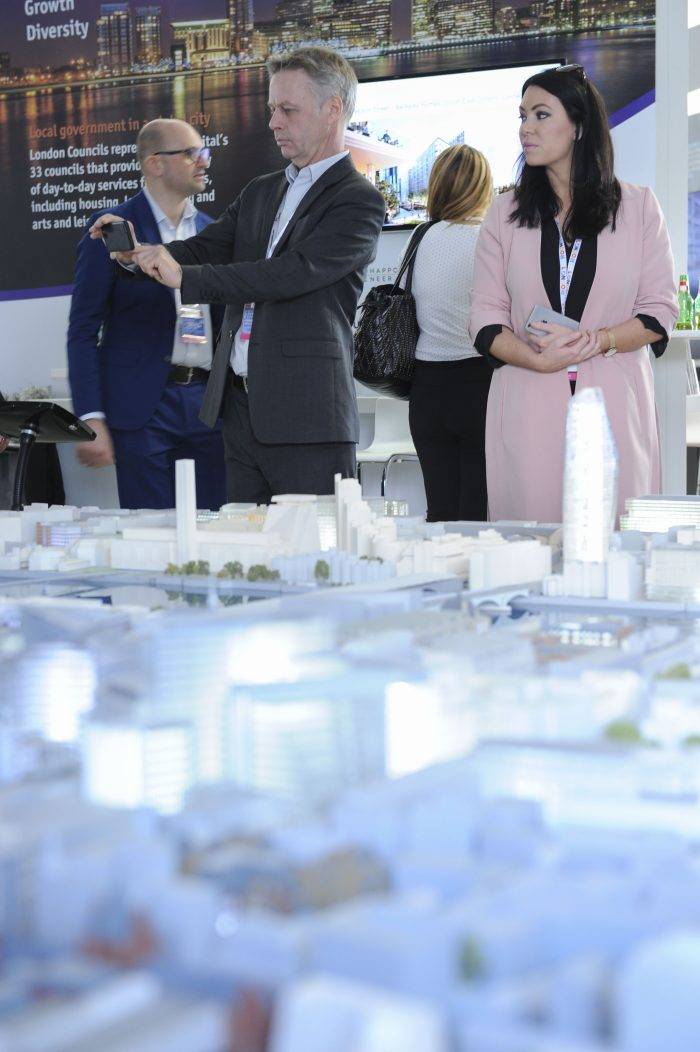 MIPIM celebrated its 30th anniversary during uncertain political and economic times, yet the mood was positive and even the backdrop of an impending Brexit decision failed to derail the UK contingent. However, the one thing missing from MIPIM in 2019 was British politicians. They were all back home, participating in decisive votes in the House of Commons as Parliament continued to kick the Brexit can down the road.
MIPIM celebrated its 30th anniversary during uncertain political and economic times, yet the mood was positive and even the backdrop of an impending Brexit decision failed to derail the UK contingent. However, the one thing missing from MIPIM in 2019 was British politicians. They were all back home, participating in decisive votes in the House of Commons as Parliament continued to kick the Brexit can down the road.
Uncertainty over what happens next – an ongoing uncertainty as it turned out – was perhaps the reason why the B-word was rarely mentioned, because few within the real estate industry really have a sense of where it’s all taking the UK, or Europe for that matter.
A capital idea
 London showcased itself from its usual sea-facing pavilion, with the signature model at its centre. Recent research published by the City of London Corporation and City Property Association revealed that, despite Brexit worries, London is still seen as the best destination for large companies to locate global teams – ahead of New York, Paris and Singapore.
London showcased itself from its usual sea-facing pavilion, with the signature model at its centre. Recent research published by the City of London Corporation and City Property Association revealed that, despite Brexit worries, London is still seen as the best destination for large companies to locate global teams – ahead of New York, Paris and Singapore.
Part of the capital’s evolution is about reconfiguring floorspace to meet the demands of an increasingly diverse occupier base. The City Plan 2036 has been devised to encourage support as tech firms play an increasingly important role across London. With 99% of City firms SMEs, there are also growing demands for flexible workspace to support start-ups, incubators and other fast-growing firms.
Indeed, a tipping point in the need for flexible office space has been passed, as businesses driven by the need to reduce real estate costs and attract and retain employee talent turn to a mix of solutions, according to Mark Dixon, chief executive of IWG. The head of the global workspace provider said that while lots of different things had combined to drive change, three key factors are influencing the future direction of the market.
“First you have new accounting rules from this January that mean that office space has to go down as debt on the balance sheet,” he said. “That is a big influencer for CEOs. Secondly, people are demanding flexible options to the way they work and this is consistently coming up as one of the most important factors in recruiting talented people. And thirdly, if business life gets better then employees are happier and more productive.”
The wider prospect
There were, of course, towns and regions at MIPIM looking to take advantage of Brexit uncertainty and Hamburg-based real estate investor Warburg-HIH Invest was typical of a number of investors which has opened offices in Amsterdam and Vienna as it focuses its attention on the office sector in both cities.
 Matthias Brodesser, head of international transaction management, explained: “Although prices and rents are at the top because we are late in the cycle, we believe Vienna is a defensive option as it is unlikely to experience instability. After Berlin, we feel Amsterdam offers the most upward potential and may benefit if London is affected by Brexit. It is a very open-minded and commercial city, with a good work/life balance.”
Matthias Brodesser, head of international transaction management, explained: “Although prices and rents are at the top because we are late in the cycle, we believe Vienna is a defensive option as it is unlikely to experience instability. After Berlin, we feel Amsterdam offers the most upward potential and may benefit if London is affected by Brexit. It is a very open-minded and commercial city, with a good work/life balance.”
And global investor M&G Real Estate said that it is looking to acquire up to €1bn of European real estate assets this year as it seeks to increase its property holdings across Europe. Olivier Velloy, director, head of investments, Continental Europe, said that currently around 55% of M&G’s properties are in the office sector, 35% in retail and 25% in logistics, with the latter the key focus for investment during 2019 and the company well positioned to expand into residential, especially serviced assets such as senior and student living.
It was an area focused on by Jonathan Emery, managing director, Europe, at LendLease, which beyond its current projects is looking at ways to help Birmingham bring affordable housing into the city centre, ongoing work to evolve the multi-family market in London and an increasing focus on the materials and designs used as residential living becomes increasingly dense.
“I think our brand has always been known for the quality of build,” said Emery. “However, issues of materials, safety and quality are increasingly important within the market.”
Calling it home
[perfectpullquote align=”right” bordertop=”false” cite=”” link=”” color=”” class=”” size=””]Interest in residential for all life stages was a key take-out from Cannes, as was the almost de facto focus on mixed use, or place making[/perfectpullquote]
In fact interest in residential for all life stages was a key take-out from Cannes, as was the almost de facto focus on mixed use, or place making as the key strategy for any new development. This in part reflects the need for buildings and developments to reflect new ways of living, working and spending free time and the corresponding blending of uses and cross-influences between sectors which once seemed far less connected.
Of course technology has played a major part in enabling these changes and continues to redefine the relationship between landlords and occupiers. Charlie Kuntz, innovation officer at Hines, said that tenant engagement apps represent the new frontier, moving forward, to get the most from employees.
“There is also a great deal of sensor tech out there which is becoming more affordable, after being prohibitively expensive for some time,” he said. “The truth of the matter is, we don’t know a lot about how physical spaces affect people, but these are important tools on the path to understanding.”
And Jonathan Pearce, executive vice president, leasing office and industrial, North America at Ivanhoe Cambridge said a hybrid approach is essential to help employees achieve a better work-life balance. “Today’s users are no longer living two compartmentalised, parallel lives,” he said, “The use of technology and the cues of hospitality that are coming into office buildings are very compelling.”
__________________________________
 Anna King is a writer and marketing and PR consultant specialising in the built environment. www.informare.co.uk
Anna King is a writer and marketing and PR consultant specialising in the built environment. www.informare.co.uk















April 5, 2019
Brexit, Brits and blending: what MIPIM told us about the state of corporate real estate
by Anna King • Comment, Property
Uncertainty over what happens next – an ongoing uncertainty as it turned out – was perhaps the reason why the B-word was rarely mentioned, because few within the real estate industry really have a sense of where it’s all taking the UK, or Europe for that matter.
A capital idea
Part of the capital’s evolution is about reconfiguring floorspace to meet the demands of an increasingly diverse occupier base. The City Plan 2036 has been devised to encourage support as tech firms play an increasingly important role across London. With 99% of City firms SMEs, there are also growing demands for flexible workspace to support start-ups, incubators and other fast-growing firms.
Indeed, a tipping point in the need for flexible office space has been passed, as businesses driven by the need to reduce real estate costs and attract and retain employee talent turn to a mix of solutions, according to Mark Dixon, chief executive of IWG. The head of the global workspace provider said that while lots of different things had combined to drive change, three key factors are influencing the future direction of the market.
“First you have new accounting rules from this January that mean that office space has to go down as debt on the balance sheet,” he said. “That is a big influencer for CEOs. Secondly, people are demanding flexible options to the way they work and this is consistently coming up as one of the most important factors in recruiting talented people. And thirdly, if business life gets better then employees are happier and more productive.”
The wider prospect
There were, of course, towns and regions at MIPIM looking to take advantage of Brexit uncertainty and Hamburg-based real estate investor Warburg-HIH Invest was typical of a number of investors which has opened offices in Amsterdam and Vienna as it focuses its attention on the office sector in both cities.
And global investor M&G Real Estate said that it is looking to acquire up to €1bn of European real estate assets this year as it seeks to increase its property holdings across Europe. Olivier Velloy, director, head of investments, Continental Europe, said that currently around 55% of M&G’s properties are in the office sector, 35% in retail and 25% in logistics, with the latter the key focus for investment during 2019 and the company well positioned to expand into residential, especially serviced assets such as senior and student living.
It was an area focused on by Jonathan Emery, managing director, Europe, at LendLease, which beyond its current projects is looking at ways to help Birmingham bring affordable housing into the city centre, ongoing work to evolve the multi-family market in London and an increasing focus on the materials and designs used as residential living becomes increasingly dense.
“I think our brand has always been known for the quality of build,” said Emery. “However, issues of materials, safety and quality are increasingly important within the market.”
Calling it home
[perfectpullquote align=”right” bordertop=”false” cite=”” link=”” color=”” class=”” size=””]Interest in residential for all life stages was a key take-out from Cannes, as was the almost de facto focus on mixed use, or place making[/perfectpullquote]
In fact interest in residential for all life stages was a key take-out from Cannes, as was the almost de facto focus on mixed use, or place making as the key strategy for any new development. This in part reflects the need for buildings and developments to reflect new ways of living, working and spending free time and the corresponding blending of uses and cross-influences between sectors which once seemed far less connected.
Of course technology has played a major part in enabling these changes and continues to redefine the relationship between landlords and occupiers. Charlie Kuntz, innovation officer at Hines, said that tenant engagement apps represent the new frontier, moving forward, to get the most from employees.
“There is also a great deal of sensor tech out there which is becoming more affordable, after being prohibitively expensive for some time,” he said. “The truth of the matter is, we don’t know a lot about how physical spaces affect people, but these are important tools on the path to understanding.”
And Jonathan Pearce, executive vice president, leasing office and industrial, North America at Ivanhoe Cambridge said a hybrid approach is essential to help employees achieve a better work-life balance. “Today’s users are no longer living two compartmentalised, parallel lives,” he said, “The use of technology and the cues of hospitality that are coming into office buildings are very compelling.”
__________________________________